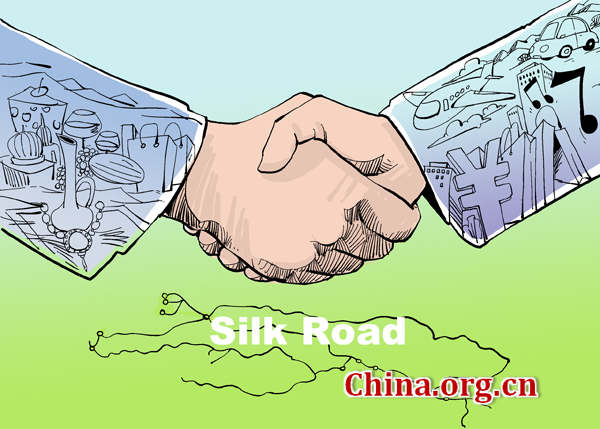Profound regional impact from China's Silk Road initiatives
 0 Comment(s)
0 Comment(s) Print
Print E-mail Xinhua, November 19, 2014
E-mail Xinhua, November 19, 2014
|
[By Gou Ben] |
The "Belt and Road" initiatives raised by China to revive the ancient Silk Road and promote shared prosperity are set to make a profound long-term positive impact on Asia and the world.
A latest development came when Chinese President Xi Jinping announced on Nov. 8 that China would set up a Silk Road fund worth 40 billion U.S. dollars to support infrastructure, resources, industrial and financial cooperation and other projects related to connectivity for countries along the "Belt and Road."
The initiatives are a land-based belt from China via Central Asia and Russia to Europe, and a maritime Silk Road through the Straight of Malacca to India, the Middle East and East Africa.x Chang Jian, Barclays chief China economist, said in a research report that the initiatives will create trade and investment opportunities in infrastructure and construction, including transportation, ports, pipelines, power generation and environmental projects, as well as stimulating energy and resource exchanges, consumption and tourism.
"We think the initiative is underpinned by a win-win approach and a strong desire from China to export excess capacity, invest abroad and diversify its foreign exchange reserves. China has competitive edges in capital and expertise, while many Asian countries face large financing gaps," Chang said.
She said that the establishment of the China-led Asian Infrastructure Investment Bank (AIIB) in October demonstrated the regional desire to cooperate.
The Asian Development Bank estimates infrastructure financing demand in Asia will be around 8 trillion U.S. dollars between 2010 and 2020. The latest HSBC global research report also said that China's infrastructure sector has the capacity to meet the needs of Asia and further abroad. It said China's overseas investment should also generate demand for its exports and help take up the economic slack.
"Since the investment will be in roads, railways, ports and airports, it should benefit all parties, due to lower trade costs. Investing in infrastructure along these routes will serve to develop new export markets for China, generate better and longer-term returns on its foreign reserves, and act as another channel through which China can internationalize its currency, complemented by the likely boost to trade flows," the HSBC report said.
The initiatives should also bring more investment to the less developed central and western parts of the country.







Go to Forum >>0 Comment(s)